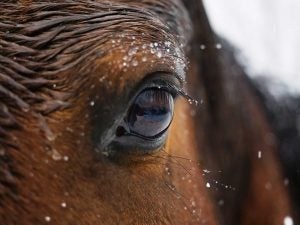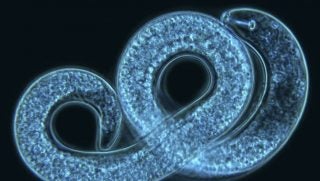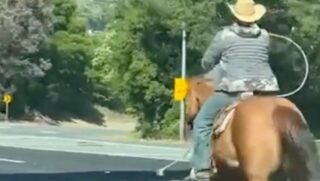If you own a horse (or several!), you have probably seen their weight fluctuate at some point. Some reasons for weight loss are easy to control and measure, such as increased exercise, but others are harder to detect and treat. If you have a horse that is losing weight, and you are unsure why, here are five reasons that your horse may be losing weight. The reasons why your horse is losing weight is not limited to this list, but these are common reasons why you’ve been having trouble to keep weight on your horse. Weight loss may be related to a disease, in which case you should work closely with your vet and/or equine nutritionist.
1. Extreme weather changes
Most horses tend to lose weight in the winter as they burn more energy to stay warm and have less grass to choose from. Likewise, horses that live in extremely hot summers may experience a weight loss during the summer due to the suppression of appetites caused by heat. Increasing their feed and hay intake is an easy way to combat this kind of weight loss. As horses digest hay they generate heat through digestion, and increased feed gives them increased energy.
2. Dental problems
Dental care can be overlooked in horses, but if your horse is losing weight, it may be time to have their teeth examined by your veterinarian to determine if that is the cause for weight loss. Horses’ teeth have a deep root and short crown, and over time the teeth erupt to compensate for the wear on the teeth from eating high-fiber diets. Due to this eruption, horses get sharp points and uneven growth to compensate for the grinding done while chewing over the years. Consulting your veterinarian for routine dental work, which eliminates uneven teeth growth and helps horses chew properly. In older age, horses wear their teeth down to the point that the teeth can no longer compensate for the grinding down, and they aren’t able to adequately chew and digest their normal diet. At that point, a new nutritional plan will be needed so the horse can utilize the most nutrients out of a diet that is easier to digest.

3. Parasites
Parasites are a very common cause of weight loss in horses. Internal parasites compete with protein utilization and can also disrupt the digestive tract tissue, causing irritation, which makes it hard for a horse to maintain weight. Horses younger than 3 years old and older horses are more susceptible to parasites. Internal parasites can be hard to determine without a fecal sample run at least yearly by your veterinarian. Fecal samples also reveal which parasites your horse carries, their parasite egg count, and if certain parasites are becoming resistant to your deworming regimen. Parasite control has changed over the years as parasites have evolved to become resistant to treatment. Having an effective deworming program is important to each horse, and not just the herd. Consult your veterinarian to come up with an effective deworming program.
4. Pecking order
If horses are turned out in a group, a natural pecking order is established that can play a role in weight loss. Horses that are established by the herd as lowest on the pecking order may experience bullying. Horses that are higher up the pecking order may run other horses off their feed and hay if they aren’t separated to be fed. Even if the horses are fed grain separately, but share communal hay, they may still experience weight loss since forage is the biggest component of a horse’s diet. Separating skinnier horses out of the herd to eat both grain and forage allows you to monitor their true intake, and also reduces their stress of having to deal with aggression at meal time.
5. Hay quality
Like mentioned above, hay is the largest component of a horse’s diet. If a horse is eating all their grain and hay, but still losing weight, hay quality may play a factor in weight loss. While it is hard to quantify the quality of pasture forage, hay forage you provide the horse can be tested for quality. Even if you buy the same type of hay consistently from the same supplier, the hay quality can change from purchase to purchase depending on the age of maturity of the grass when harvested and the environmental conditions of the location of the grass. If finding hay that is of better quality is unavailable, a grain concentrate can be added to the diet to make up for the nutrients that are missing from the hay.
Rebecca Sherwood is Kentucky-born and Texas-raised and has worked as an editor for the USDA. She earned her degree in animal science from Texas A&M University.



